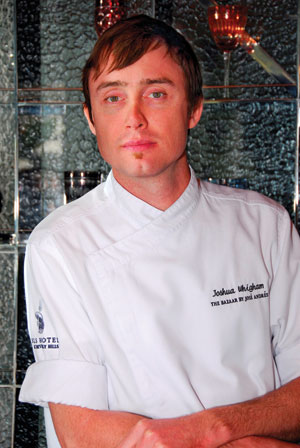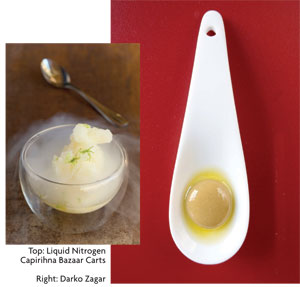BY TISHIN DONKERSLEY, M.A.

Following in the footsteps of the renowned Chef José Andrés, whose impressive list of awards, feature articles, and television appearances have shot him to culinary stardom for his introduction of avant-garde Spanish cuisine, is no easy task. But for Chef Joshua Whigham, Chef de Cuisine at The Bazaar, Andrés’ restaurant in the SLS Hotel in Beverly Hills, working with a great chef like Andrés helps him stay focused on what’s important – creating a connection between people and food.
Charged with carrying on Andrés’ tradition of forward-thinking excellence at a restaurant that had been named “Restaurant of the Year” by Esquire Magazine, and a James Beard Foundation finalist for “Restaurant of the Year” in 2009, Chef Joshua had big shoes to fill…but he was thoroughly prepared for the challenge. Prior to joining The Bazaar, he worked as part of Andrés’ creative team for many years, at prominent restaurants like Minibar, Café Atlantico and Zaytinya in Washington D.C., as well as Hook in D.C. and Jack’s Luxury Oyster Bar in New York City. And all that experience seems to paying off – Chef Joshua certainly provided a memorable dining experience for this editor.
As you enter The Bazaar restaurant through the chic SLS Hotel, the luxury and eclectic environment immediately sparks your curiosity – you’ll find red neon backlit tables with monkey head statues placed on each table, an open kitchen welcoming you to watch it all happen, and the dark furniture and floors to create an intimate experience.
To simplify a somewhat complex concept, “avant-garde” cooking refers to utilizing new and unique cooking methods (technical innovations) while using the entire dining experience to tell as story with the food – a style for which Andrés is so well-known. With menu items like “Not Your Everyday Caprésé” with cherry tomatoes and liquid mozzarella, and “Grapefruit And Olive Oil” dessert, featuring olive oil ice cream, mint and textures of grapefruit, The Bazaar is definitely blazing some culinary trails!
Chef Joshua described the preparation of his dishes as a “modern technique,” but continued, “It has been done in industrialized cooking since the 1940s. It’s about taking those ingredients and concentrating them on pure flavor – focusing on one ingredient and paying tribute to the flavors and essence of that ingredient.” The example he uses is that of a jar of olives that has been hiding in your mother’s refrigerator, long past the expiration date, soaking in its own juice. When you bite into it, the pureness of the rich flavor bursts in your mouth. It is this ability – to extract the pureness of the ingredient – that is the foundation of Chef Andrés’ modern cuisine, which he uses in every aspect of his cooking. “Even focusing on making good rice, roasting of vegetables, cleaning the vegetables, reduction of sauce or balancing a dish with salt,” he explains – all to extract the true essence from the ingredients.
Chef Joshua’s favorite ingredient is olive oil, which he prefers over butter and infused oils because of its ability to emphasize the flavor of the foods. “It is a necessity in cooking and instantly makes a dish lighter and vibrant,” he says. “Butter has its place, but olive oil is the master. If you can start with a good olive oil, your dish will get better,” he continues. His favorite is an olive oil called Marqués de Valdueza, made by a friend of José Andrés, and sold at Whole Foods. “It has clean, nice, grassy node, and finishes with a touch of spice,” says Chef Joshua.
With a growing farm-to-table trend, The Bazaar maintains their standards, but changes the menu with the season. Chef Joshua relies on relationships with the farmers to obtain the highest-quality produce. “We buy locally responsible foods when we can, which is around 45 percent right now. My goal is to work more with local farmers, and those along the coast,” he explains.
As any chef knows, produce delivered from other parts of the country doesn’t always arrive when expected, and working with local in-season foods can work to the chef’s advantage without compromising taste or standards. “We change our menu with the season and, if need be, we can change the ingredients without changing the original dish. Instead we fold available ingredients into the current menu and elevate the dish,” Chef Joshua said.
 For Chef Joshua, eating is a very personal experience, and he is happiest when he can elevate that experience for others through the food he serves at The Bazaar. “When they taste the food, they will feel it; they will feel energized. They will create the need on a subconscious level to come back. During the meal there is a switch and change – rather than just eating the food, they feel it. Eating is very personal, and once you have that connection with your guest, then it becomes more intimate.
For Chef Joshua, eating is a very personal experience, and he is happiest when he can elevate that experience for others through the food he serves at The Bazaar. “When they taste the food, they will feel it; they will feel energized. They will create the need on a subconscious level to come back. During the meal there is a switch and change – rather than just eating the food, they feel it. Eating is very personal, and once you have that connection with your guest, then it becomes more intimate.
As they are eating, you are creating different textures; and textures make people think. Once people start thinking about what they are eating, they are going to feel it and experience more. I want them to leave feeling ‘What just happened?’ José is all about that experience.” Dining at The Bazaar will bring out the adventuresome foodie in you and surprise you with a combination of flavors you wouldn’t believe existed – such as the starters jicama wraps with mint, basil, pickled ginger, cucumbers with coconut dressing or the eggplant tempura with local honey and yoghurt. As we made our way into the kitchen, my curiosity about Chef Joshua was piqued, and, as a devoted foodie, I probed for advice from a true expert.
When are you at your most creative?
Once everything is settled in the restaurant, that’s when the ideas will start to come. At home, I’ve been working on my paella, and you have to have the patience to watch the paella for 25-30 minutes. There is a point for the rice – about 17 minutes – where the starches will release. I’ve only seen it once and I’m working on perfecting this dish.
What are the must-haves in the pantry?
Olive oil, olive oil, olive oil, not too many vinegars, maybe sherry and red wine vinegar, fresh herbs, good spices – and don’t skimp on quality with herbs.
What are some of the toughest ingredients people underestimate when working in the kitchen?
A head of broccoli and kale.
What advice do you have for young chefs?
If you decide, there is a commitment. Don’t go halfway with it. Do it out of passion, but it’s more for love of the business, love of serving people, and that one moment when you see a person’s eyes light up because they just experienced your food. The hours are long, it’s a pull on your body, but it’s worth it in the end. The most important thing for the new generation of chefs is to let go of the ego. You need to cook from a good place. You have to establish a good foundation and work from there. Also respect the allergies. As a professional, you have to really stop, clean your tools, separate them, separate the food, even if your station is going down, you need to stop and be responsible for someone’s health.
In the end, what have you learned?
It’s for the love of the food, and the love of the art of the business. It’s the satisfaction of connecting people to the food. Also knowing you don’t know everything, but when you work with great chefs, it helps you stay focused on what is important. And creativity has its focus and its place.






